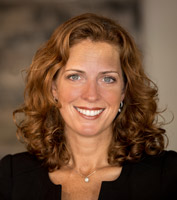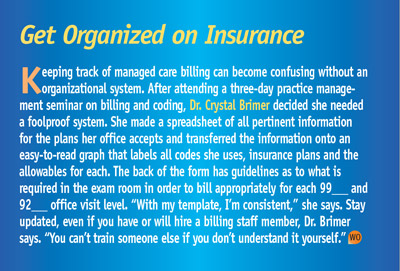This story was originally published in our November 2009 issue. Since then, Dr. Brimer has opened Focus Eye Care, which was featured for its practice design.


Crystal Brimer, OD, of Wilmington, North Carolina, is a perfectionist—especially when it comes to following up with patients who have been referred for specialty care. First of all, she’d rather treat or monitor patients herself, rather than refer, when it’s within her expertise to do so. “I want them to get the precise care I think they need, and patients don’t always do what you want them to do,” she says. As more doctors, staff and sets of instructions come into play, the chance for mixed messages increases. That can result in noncompliant or overwhelmed patients. “It bothers me to see someone fall through the cracks.” So, Dr. Brimer has created a process that makes sure she and her staff keep track of their referred patients.
Pink sheet to spreadsheet. A pink sheet of paper is attached to every referred-out patient’s chart. The sheet lists the doctor to whom the patient is referred, appointment date and time. The information is entered onto a spreadsheet on the office computer system. The spreadsheet is later used to confirm that consult notes are received from the specialist after the appointment.
Check in. A note is put in the computer at the bottom of the schedule on the date the patient should be attending his or her referral appointment. The front desk then calls that office to confirm that the patient showed up. Staff members make sure that appointments are made and that patients go. “I don’t want to find out six months later that someone did not make the visit,” Dr. Brimer says. “If someone misses an appointment, cancels or is a no-show, the chart always ends up on my desk.”
Send a letter. If patients miss a referred visit but it is not their initial consult with the specialist (for a less serious condition), Dr. Brimer reminds them in a letter to reschedule the appointment with a specialist, and why. She includes a handwritten note at the bottom to encourage the patient to reschedule.


Personally make a phone call. If the initial consult is missed when a referred visit is extremely important or could result in a liability issue, Dr. Brimer calls the patient to make sure he or she completely understands the importance of this extra visit. Dr. Brimer or a technician makes it a point to check in with patients who have been prescribed new contact lenses, eyeglasses or medication. “I tell the patient, ‘If it is working, continue. If not, let’s make another plan.’”
Through an externship and her first job, Dr. Brimer saw how easy it is to lose track of patients. She determined when she opened her own practice in 2002 that she would create a welcoming place where patients would want to return. Keen on interior design and with a great eye for style, she’s created a boutique-style office where she works with Joe Nemeth, her husband, optician and office manager. “We make people feel at home and welcome,” which undoubtedly is a big reason why patients love to return.
Photo credit: Jennifer Byrd, Byrds Eye View, LLC



